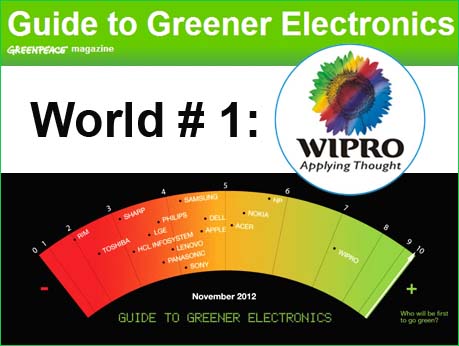
San Francisco(USA), November 20: Indian IT major Wipro, has stormed into the Greenpeace ranking of the world’s greenest electronic companies to take the top spot, beating global biggies like HP, Nokia, Acer, Dell and Samsung. Another Indian IT player – HCL figures at # 13 in the list of 16 companies.
“Wipro has set a new benchmark for sustainability, not only in India but across the globe, that will have a long-term impact in shaping the green energy debate in the electronics industry,” said Greenpeace India Senior Campaigner Abhishek Pratap. “The rest of the electronics sector should follow in the footsteps of Wipro’s climate leadership.”
In its first appearance in the International version of the Guide to Greener Electronics, Wipro scored the most points due to its efforts to embrace renewable energy and advocacy for greener energy policies in India. Wipro also scored well for post-consumer e-waste collection for recycling and for phasing out hazardous substances from its products.
Global electronic companies must do more to end the use of climate changing dirty energy in their manufacturing and supply chains, said a report released yesterday by Greenpeace International. While these companies have made progress at removing toxic chemicals from the mobile phones, computers and tablets they produce, their manufacturing and supply chains are still too heavily dependent on dirty energy sources that are contributing to climate change.
Greenpeace International’s 18th version of the Guide to Greener Electronics ranked 16 electronics companies based on their commitment and progress in three environmental criteria: Energy and Climate, Greener Products and Sustainable Operations.
"The next big environmental challenge for consumer electronics companies is to reduce their carbon pollution," said Greenpeace International IT analyst Casey Harrell. "Consumers have stated that they want greener electronics, which means high functioning gadgets that are built and powered by renewable energy."
The bulk of the carbon footprint associated with many electronic devices is buried in the manufacturing chain, where the electronic devices are assembled. More carbon is used in the manufacture of some gadgets, such as tablets and smart phones, than consumers ever use after buying them.
HP dropped from No. 1 in last year’s edition of the guide to No. 2. Nokia moved up from No. 4 to No. 3. Taiwanese computer maker Acer was the most improved company in the guide, moving up nine spots to No. 4 for engaging with its suppliers on greenhouse gas emissions, hazardous substances, conflict minerals and fibre sourcing. Dell dropped from No. 3 to No. 5. Apple dropped slightly from No. 5 in last year’s edition to No. 6. Blackberry maker RIM did not improve from its 16th ranking, the bottom of the group
The report’s detailed comments on Wipro:
On the Energy criteria Wipro shows leadership in reducing greenhouse gas (GHG) emissions and increasing its use of renewable energy. Wipro is the top scorer for committing to reduce its absolute GHG emissions by 44% by 2015 from a base year of 2008, highest among top Indian and international companies. Wipro provides a detailed action plan to meet its annual reduction targets, including energy efficiency measures and investment in renewable energy through direct generation and purchase. The company sets a goal of achieving 85% of its emissions reduction through renewable energy. Wipro also makes significant efforts in advocating for clean energy and solar policy, and to promote the role of Information and Communication Technology in climate change mitigation through policy documents it has submitted to the Indian government.
On Products criteria, Wipro receives maximum points for placing energy efficient products in the market. All of Wipro’s new products currently meet latest Energy Star compliance, while 52% of their products exceed ES 5.0 standards. Wipro also does reasonably well at phasing out hazardous chemicals from its products, stating that 80% of its products are free of polyvinyl chloride plastic (PVC) and brominated frame retardants (BFRs), though it has missed its goal of being 100% PVC/BFR-free by 2012. Wipro needs to provide updated information on its use of post-consumer recycled plastics and list which products use them. It also needs to provide detailed information about its product life cycle, where it currently scores a zero.
On the Sustainable Operations criteria, Wipro continues to receive the maximum score for its effective take-back policy and performance on the collection and recycling of post-consumer e-waste. It provides convenient take-back service to its customers through 17 direct and 300 authorised collection centres, the highest in India by any PC manufacturer. The company also performs reasonably well on its chemical management policy and precautionary principle. Wipro scores additional points for establishing conflict minerals policy and practices. However, the company has not established and implemented a paper procurement policy that avoids sourcing from suppliers involved in deforestation and illegal logging.
Full rankings : http://www.greenpeace.org/international/Global/international/publications/climate/2012/GuideGreenerElectronics/Full-Scorecard.pdf